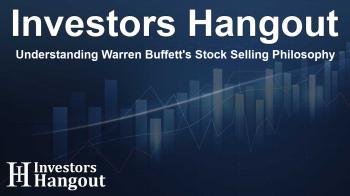Understanding Warren Buffett's Stock Selling Philosophy

The Investment Wisdom of Warren Buffett
Warren Buffett, often recognized for his distinctive approach to investing, is a master of the buy-and-hold strategy. While most investors frequently trade stocks, Buffett's philosophy leans towards holding stocks for the long term. His decisions to sell are rarely made, but when they happen, they signal significant changes within a company.
The Core Philosophy Behind Selling
Buffett's investment philosophy revolves around the belief in a company's enduring competitive advantage. As he famously noted, if this advantage fades away, it prompts a reevaluation of whether to continue holding the stock. This strategy relies heavily on trust in the fundamentals of a business over its historical performance.
Patience in Investing
Buffett emphasizes that he is more cautious when it comes to selling stocks compared to the average investor. He expressed this point during Berkshire Hathaway's annual meeting, indicating that when he invests, his goal is to stay invested for as long as possible. Holding stocks for decades is common for Buffett, showcasing his long-term view.
Indicators for Divesting
When Buffett considers selling, it's typically due to specific criteria. If he feels that the competitive edge of a company has substantially diminished, or if management loses credibility, he may choose to dispose of that stock. It's a disciplined and strategic process that highlights his commitment to sound investing principles.
Case Study: The Newspaper Industry
Buffett's approach to investment became particularly evident during his extensive involvement in the newspaper industry throughout the 1970s. At the time, he regarded newspapers like the Omaha World-Herald and Buffalo News as robust and untouchable franchises. However, as the digital wave transformed how news was consumed, the industry began to experience severe revenue challenges.
Responding to Market Changes
Beginning in the early 2000s, it became apparent that the competitive landscape had shifted dramatically. Understanding the need to adapt to these changes, Buffett made the tough decision to sell his newspaper portfolio in early 2020. This represented a pivotal moment and indicated his recognition that the competitive advantages that once upheld the newspaper industry had significantly eroded.
Significance of Long-Term Evaluation
This strategic pivot in Buffett's portfolio management serves as a reminder of the importance of reassessing long-term competitive advantages, even for businesses that once appeared invincible. His decisions reflect a broader lesson in investing: remaining responsive to fundamental shifts can safeguard against long-term losses.
Conclusion: Lessons for Investors
Warren Buffett's investment decisions resonate with timeless principles in finance. By focusing on a company's competitive advantages and exercising patience, investors can forge a path towards sustainable success. His insights serve as a valuable guide, especially regarding when to sell a stock. The mantra remains clear: if the fundamentals shift significantly, it may be time to reevaluate your position.
Frequently Asked Questions
What is Warren Buffett's primary investment strategy?
Warren Buffett primarily employs a buy-and-hold strategy, maintaining investments for the long term while focusing on companies with strong competitive advantages.
When does Buffett decide to sell a stock?
Buffett is inclined to sell a stock when he perceives a loss of the company's competitive edge or when he loses faith in its management.
How does Buffett view his investment decisions over time?
Buffett believes that if he makes the right investment decision initially, it's best to stay invested for the long term, sometimes even decades.
What was a significant change Buffett made in his investments?
A notable change in Buffett's strategy involved selling his newspaper portfolio when he recognized that the industry was significantly impacted by digital platforms.
How can investors apply Buffett's lessons?
Investors can learn from Buffett by assessing a company's long-term competitive advantages and remaining adaptable to changes in the market landscape.
About The Author
Contact Ryan Hughes privately here. Or send an email with ATTN: Ryan Hughes as the subject to contact@investorshangout.com.
About Investors Hangout
Investors Hangout is a leading online stock forum for financial discussion and learning, offering a wide range of free tools and resources. It draws in traders of all levels, who exchange market knowledge, investigate trading tactics, and keep an eye on industry developments in real time. Featuring financial articles, stock message boards, quotes, charts, company profiles, and live news updates. Through cooperative learning and a wealth of informational resources, it helps users from novices creating their first portfolios to experts honing their techniques. Join Investors Hangout today: https://investorshangout.com/
The content of this article is based on factual, publicly available information and does not represent legal, financial, or investment advice. Investors Hangout does not offer financial advice, and the author is not a licensed financial advisor. Consult a qualified advisor before making any financial or investment decisions based on this article. This article should not be considered advice to purchase, sell, or hold any securities or other investments. If any of the material provided here is inaccurate, please contact us for corrections.

